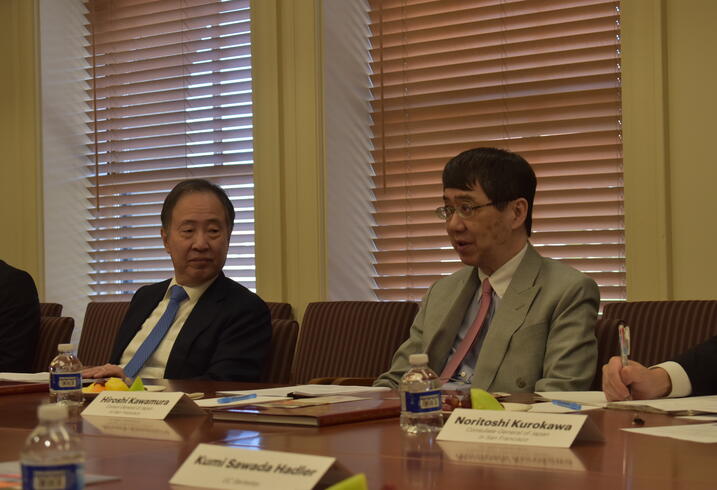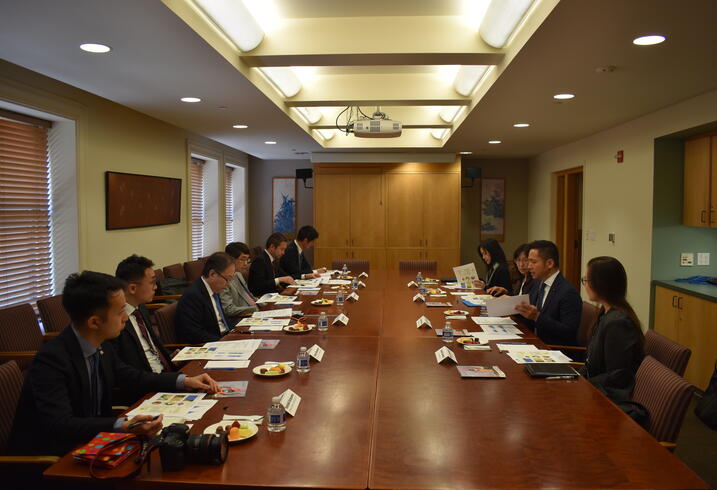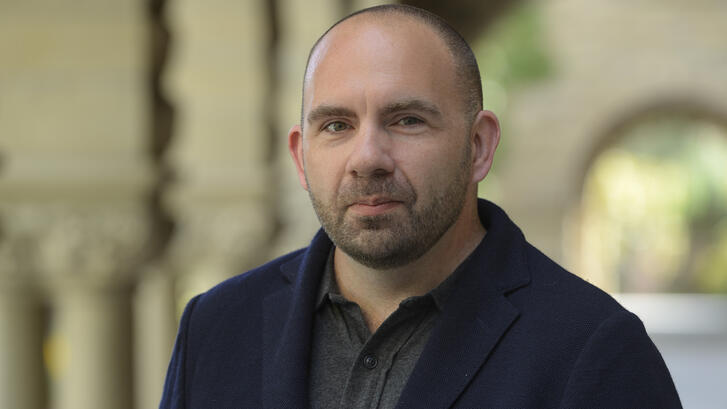Japan’s Top Envoy to the U.S. Discusses the State of Japan Studies in Higher Education with Stanford and UC Berkeley Experts
Japan’s Top Envoy to the U.S. Discusses the State of Japan Studies in Higher Education with Stanford and UC Berkeley Experts
At an in-person meeting of a joint delegation from Japan's Embassy to the United States and Consulate-General of Japan in San Francisco with a panel of experts from Stanford and UC Berkeley, Japanese Ambassador Koji Tomita stressed the importance of bilateral academic collaboration in the continual development of the U.S.-Japan partnership.

On March 22, 2022, APARC's Japan Program welcomed a delegation from the Embassy of Japan in the United States and the Consulate-General of Japan in San Francisco, including Ambassador Koji Tomita and Consul-General Hiroshi Kawamura, who met with a joint panel of scholars and administrators from Stanford and the University of California, Berkeley for a discussion about fostering a greater understanding of Japan studies in the United States.
APARC Deputy Director and Japan Program Director Kiyoteru Tsutsui presented data on enrollment and employment statistics for Japanese studies in higher education. According to the report, Japanese studies have been in a slow state of decline since the late 1980s, when many in the United States viewed Japan as an economic threat and the country was not as well-understood as it is today. Despite this decline, students today are still very interested in studying Japan and are eager to visit the country.
Naomi Funahashi, Manager of the Reischauer Scholars Program and Teacher Professional Development at the Stanford Program on International and Cross-Cultural Education (SPICE), presented outcomes from SPICE's outreach efforts and promotion of Japanese studies in the K-14 context. Funahashi indicated strong interest in and engagement with SPICE curricular units focused on Japan and with its local student programs in six regions, one university, and two high schools in Japan.
Sign up for APARC newsletters to receive our experts' analysis and commentary.





Professor Junko Habu, Chair of the Center for Japanese Studies (CJS) and Professor of Anthropology at UC Berkeley, along with Kumi Sawada Hadler, Program Director of CJS, described logistical challenges Japan scholars have faced during the COVID-19 pandemic, including the inability to access the country under lockdown, and indicated that, across the board, universities are not providing as much support for Japanese studies as they used to, especially in terms of endowed faculty positions and departmental "slots" specifically for Japan specialists.
Ambassador Tomita and Consul-General Kawamura agreed that more support was needed to bolster scholarships of Japan. Ambassador Tomita stated that over his long career, he has seen the theoretical focus of Japan studies in the United States shift away from bilateral relations between the two countries toward the region at large. He noted that the public discussion is increasingly directed at Japan as part of a broader complex of nations in East Asia. Consul-General Kawamura indicated that the pandemic has posed a host of challenges for his office but that Japan will continue to open its doors to scholars in the future.
The meeting concluded with a reaffirmation of the longstanding and crucial relationship between the two nations and of the importance of Japan studies in the United States in fostering fruitful collaboration between the two nations.








